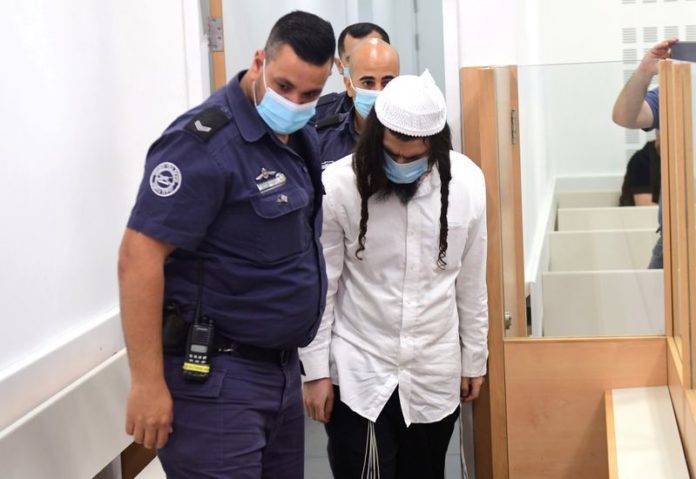Oliver Holmes
The Guardian / September 14, 2020
Amiram Ben-Uliel murdered Saad Dawabsheh, his wife and child in a 2015 arson attack.
A court in Israel has ruled a Jewish extremist will serve three life sentences for killing a Palestinian couple and their toddler in a 2015 firebomb attack in the occupied West Bank, murders that contributed to surging violence at the time.
In handing out the sentence, the Lod district court said Amiram Ben-Uliel, 26, an Israeli settler, had meticulously planned the arson attack, which “stemmed from the radical ideology he held, and racism”. The punishment was close to the maximum penalty, it said.
The Dawabsheh family killings in the village of Duma rocked Palestine and Israel, where it was widely condemned at the time, with the Israeli prime minister describing it as “an act of terrorism in every respect.”
Ben-Uliel had spray-painted “Revenge” and “Long live the Messiah” on the walls of the house, before smashing the windows and throwing a flaming molotov cocktail inside.
Eighteen-month-old Ali Dawabsheh died on the day. His father, Saad, lived for over a week despite third-degree burns covering most of his body, while Ali’s mother, Riham, died five weeks after the attack. Another Dawabsheh child, four-year-old Ahmed, survived the attack with severe burns.
The killings were followed by a spike in Israeli-Palestinian violence, with tensions already high following stalled peace talks the year before. Suspected Jewish extremists were accused of launching vigilante attacks on Arabs while Israel faced a series of often-deadly stabbing, shooting and car-ramming attacks by Palestinians.
Israel’s Shin Bet internal security service lauded Monday’s verdict as “an important milestone in the struggle against Jewish terrorism”.
Ahmed’s grandfather, however, told reporters outside the court that the ruling brought no respite. “What will the court’s decision give me? What will it give to Ahmed?” Hussein Dawabsheh said. “It won’t return anything to him.”
Ben-Uliel’s wife told reporters that the judges “decided to incriminate my husband at any price”. She said the family would appeal to Israel’s supreme court.
A second, underage defendant in the case was convicted as an accessory in a plea bargain, with a sentence pending.
Israel’s critics argue that long sentences for high-profile crimes have little impact when Palestinian continue to live under occupation, with fewer rights than the settlers around them.
Unlike the Dawabsheh killings, other less prominent and non-deadly attacks by settlers against Palestinians are ignored by Israeli authorities, rights groups said. Meanwhile, Palestinian suspects are frequently arrested and shot, with some killed in the process.
Lior Amihai, the executive director of Israeli human rights group, Yesh Din, said Monday’s sentence was important but “not sufficient in dealing with ideological crimes by Israelis against Palestinians”.
Between 2005 and 2019, 91% of investigation files opened into suspected harm by Israeli civilians against Palestinians were closed without an indictment, according to Yesh Din data.
“Long years of non-enforcement and failure in treatment have allowed the violence of Amiram Ben-Uliel and his like to rage and harm innocent people, as they harmed the Dawabsheh family,” Amihai said.
Oliver Holmes is the Jerusalem correspondent for The Guardian













